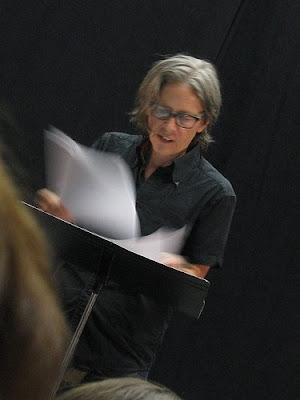Just finished: Sorry, Tree, poems by Eileen Myles. Most have short lines and are from one to three pages long. I like how their associations reach farther than my logical mind, but somehow I don’t feel lost. The endings feel like endings, but not overly tidy.
Here’s a bit from “Fifty-Three” that reminded me of my own desire to just look at trees and hang out with them:
I desire a big book about
this not better than them but
their friend.
Who doesn’t love the text?
a book about trees
it’s like a park
except that all its windows
face outside
you look up at the world &
go: oh
a book is
a web I suppose
saying you come
here to go
out an
incessant
trembling bridge
which a tree
is
I imagine
a tree
my best friend
By happy coincidence, Myles will be reading at Reed! On Thursday, April 4, 6:30 PM in the chapel.
And also, though non-thematic: Sara Pennypacker’s Clementine and The Talented Clementine. I picked up Clementine because someone said it was reminiscent of Beverly Cleary’s Ramona books. Well. Clementine doesn’t name her doll Chevrolet, she names her cats after things in the bathroom. She isn’t told to “sit here for the present,” but she notes that being in gifted class has not resulted in getting any gifts yet. She gets in trouble for messing with the hair of the overachiever girl. And there’s a definite Henry-Huggins/Ramona dynamic between her and that girl’s older brother. It wasn’t reminiscent, it was downright distracting in its parallels.
I got past it, though. It is a little strange how the Clementine books are written in first person, but have more knowing smiles over the main character’s head than the Ramona books do in third person. But there are funny moments and Clementine has a great set of parents. I’m going to keep going with the series.
Reading now: the draft of a friend’s novel. I like the main character’s heartfelt voice, which reminds me of Madeleine L’Engle’s Vicky or Poly a bit. And I’m getting a glimpse of a cultural moment I missed but not by much– a decade, a degree or two of church immersion. Such a luxury to read an editor’s draft, too…hardly any typos or grammatical clunks!
About to read: A Simple Revolution: The Making of an Activist Poet, by Judy Grahn. I read a little, not much, of Grahn’s work when I was in college. I dunno, I’m having a fling with the old-skool. Lesbiate and Smash the State!
The reason I know I’m about to read A Simple Revolution (and also What If All the Kids Are White?), or at least give them a try, is that I got them through interlibrary loan and therefore can’t renew them. Which brings us to
Sadly must return mostly unread: Feeling Backward: Loss and the Politics of Queer History, by Heather Love. More academic than my usual reads, but I was intrigued by its focus on the shadow side of queer identity. Pride is compulsory, but what about the feelings it demands we get rid of, like shame, loneliness, and regret? Not that those are my favorite things to feel, but they’re key to our collective history, (see The Well of Loneliness and so on) and certainly part of most (?) of our individual and family coming-out histories.
What really made me take this book home was that I opened it to a quote from another book, José Esteban Muñoz’ Disidentifications, that I found fascinating and spooky in equal measures. Disidentifications is probably also too much theory for me, but here. “Recounting a joke that he shares with a friend, Muñoz describes plans for a ‘gay shame day parade’:
This parade, unlike the sunny gay pride march, would be held in February…Loud colors would be discouraged; gay men and lesbians would instead be asked to wear drab browns and grays. Shame marchers would be asked to carry signs no bigger than a business card. Chanting would be prohibited. Parade participants would be asked to parade single file. Finally, the parade would not be held on a central city street but on some backstreet, preferably by the river.
So now that’s here, and I can go to the book return tomorrow with a light heart.
 (This photo was taken by Tom Orange in 2008, but it’s very much what she looked like.)
(This photo was taken by Tom Orange in 2008, but it’s very much what she looked like.)